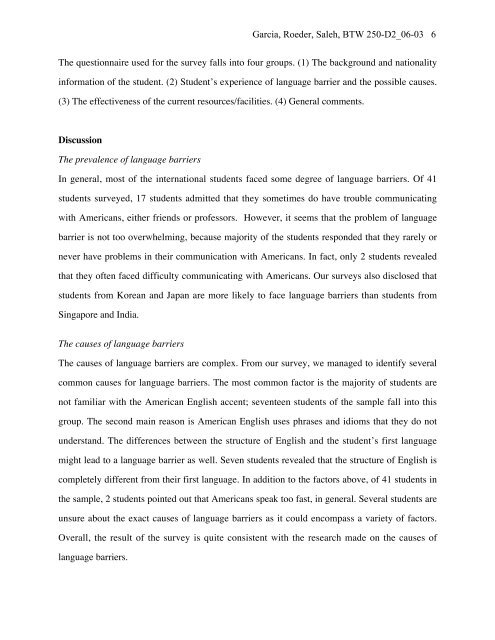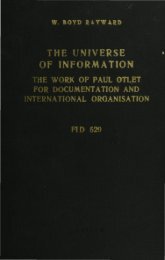Language Barriers in the University of Illinois Urbana ... - ideals
Language Barriers in the University of Illinois Urbana ... - ideals
Language Barriers in the University of Illinois Urbana ... - ideals
You also want an ePaper? Increase the reach of your titles
YUMPU automatically turns print PDFs into web optimized ePapers that Google loves.
Garcia, Roeder, Saleh, BTW 250-D2_06-03 6<br />
The questionnaire used for <strong>the</strong> survey falls <strong>in</strong>to four groups. (1) The background and nationality<br />
<strong>in</strong>formation <strong>of</strong> <strong>the</strong> student. (2) Student’s experience <strong>of</strong> language barrier and <strong>the</strong> possible causes.<br />
(3) The effectiveness <strong>of</strong> <strong>the</strong> current resources/facilities. (4) General comments.<br />
Discussion<br />
The prevalence <strong>of</strong> language barriers<br />
In general, most <strong>of</strong> <strong>the</strong> <strong>in</strong>ternational students faced some degree <strong>of</strong> language barriers. Of 41<br />
students surveyed, 17 students admitted that <strong>the</strong>y sometimes do have trouble communicat<strong>in</strong>g<br />
with Americans, ei<strong>the</strong>r friends or pr<strong>of</strong>essors. However, it seems that <strong>the</strong> problem <strong>of</strong> language<br />
barrier is not too overwhelm<strong>in</strong>g, because majority <strong>of</strong> <strong>the</strong> students responded that <strong>the</strong>y rarely or<br />
never have problems <strong>in</strong> <strong>the</strong>ir communication with Americans. In fact, only 2 students revealed<br />
that <strong>the</strong>y <strong>of</strong>ten faced difficulty communicat<strong>in</strong>g with Americans. Our surveys also disclosed that<br />
students from Korean and Japan are more likely to face language barriers than students from<br />
S<strong>in</strong>gapore and India.<br />
The causes <strong>of</strong> language barriers<br />
The causes <strong>of</strong> language barriers are complex. From our survey, we managed to identify several<br />
common causes for language barriers. The most common factor is <strong>the</strong> majority <strong>of</strong> students are<br />
not familiar with <strong>the</strong> American English accent; seventeen students <strong>of</strong> <strong>the</strong> sample fall <strong>in</strong>to this<br />
group. The second ma<strong>in</strong> reason is American English uses phrases and idioms that <strong>the</strong>y do not<br />
understand. The differences between <strong>the</strong> structure <strong>of</strong> English and <strong>the</strong> student’s first language<br />
might lead to a language barrier as well. Seven students revealed that <strong>the</strong> structure <strong>of</strong> English is<br />
completely different from <strong>the</strong>ir first language. In addition to <strong>the</strong> factors above, <strong>of</strong> 41 students <strong>in</strong><br />
<strong>the</strong> sample, 2 students po<strong>in</strong>ted out that Americans speak too fast, <strong>in</strong> general. Several students are<br />
unsure about <strong>the</strong> exact causes <strong>of</strong> language barriers as it could encompass a variety <strong>of</strong> factors.<br />
Overall, <strong>the</strong> result <strong>of</strong> <strong>the</strong> survey is quite consistent with <strong>the</strong> research made on <strong>the</strong> causes <strong>of</strong><br />
language barriers.
















